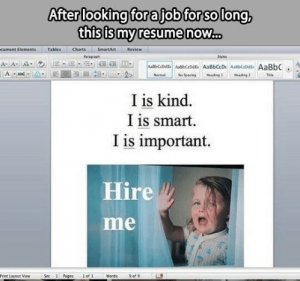Untold Truths to Advancing Your Career
By Alex Batty, MHI Marketing Communications Coordinator |@mhi_alex
*Note: The visuals are a little tongue-in-cheek, but the advice is sound. I swear.*
So you got through the school thing and now you get to do the job thing. What now? There are all sorts of little things that can be super helpful while on the job, but they don’t necessarily teach you in school. Here are a couple things we rounded up.
Resume Clean-up
Interviewers look at resumes for no longer than one minute, so keep it short and to the point. Move all the important information to the top and use numbers and percentages to quantify. Mirror the language of the job description.
Make a plan for having your dream job. What are the actions you need to make, the people you need to talk to, the conversations you need to have?
As much as we love to try and cram everything into a resume to try and convince people how awesome we are, a focused, clean resume will have a much better impact. Make sure that what you have on your resume is actually stuff of substance.
Know which tasks are important
In any given day, you’re going to have a list of things to do. However, learning to triage is important as you learn to meet deadlines. One way to help yourself learn how to do this is to communicate with your boss on priorities. Make your list and then say, “I’m going to do X, Y, and Z in this order. Is there something I should rearrange, or has something new come up that you need me to prioritize?” This is much more effective than saying, “What would you like me to do?” You’ve already done the work; your boss just needs to give it a yes or no.
This will also help you learn company priorities. What you think is important and what your boss thinks is important are two different things. Additionally it helps keep you organized and your box informed, preventing your boss asking for something on your to-do list that you haven’t completed yet.
Keep Track Of Your Accomplishments at Work
This is helpful for two reasons. First, if your boss comes and asks you for a status report (or more grumpily, “what have you been doing today?!?!”) you now have a list to read to them. The protip for this one is to keep a digital list, not a physical one. You can email it in two seconds rather than having to retype it. Your boss is going to ask you to do a lot of things that aren’t on your to-do list. Anything that takes you more then 15 minutes should be on that list. Four small 15-minute tasks equal an hour!
It’s also good for goal making and record keeping when it comes to review time. Many companies will have you create goals that will come up in your annual review and if you create this list, you have proof that you’ve accomplished your goals, making it that much easier to negotiate for a raise.
Plan Tomorrow Before You Leave
Spend 10-15 minutes before you leave to get organized and figure out the list you need to work on tomorrow. I might suggest 4:00 rather than 4:45 so your brain is less fried and you can get good prep for the next day.
This list allows you to start right away the next day and gives you an advantage over everyone else who has to come in and try to figure out where they left off. You’ll be much more productive. The best part is that you will have peace of mind once you leave the office. Your mind won’t be racing about all the things you have to do tomorrow.
Volunteer
Many companies will provide philanthropic opportunities as part of community engagement. Participate! Not only do you get to do something awesome to give back, but it’s an opportunity to get to know co-workers away from the office. Building relationships is key to succeeding at a company and now you have a work-sanctioned event to do it in.
Volunteering outside of work is also beneficial. Not only does it help with work life balance so you don’t get burned out, but it helps you meet like minded people to interact with.
Sometimes, you might even find people from work that you would normally never interact with are volunteering for the same organizations, but even if not, you can build networks outside of your company. Discussions might not necessarily advance to business, but are often grounded in a mutual desire to help others and can lead to rewarding opportunities down the road.










